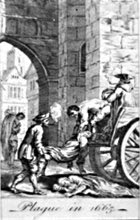© David Edwards, 2009.
.
. PRINCIPLES: President Gordon B. Hinckley, writing in an article, “If Ye Are Prepared Ye Shall Not Fear,” published in the Liahona, November 2005, p. 60–62, referred to the the Plague, also known as the Black Death. This took place in the 1300's, and millions of people died. He also referred to other pandemic illnesses, such smallpox. These diseases, too, have caused much pain and mortality over time.
PRINCIPLES: President Gordon B. Hinckley, writing in an article, “If Ye Are Prepared Ye Shall Not Fear,” published in the Liahona, November 2005, p. 60–62, referred to the the Plague, also known as the Black Death. This took place in the 1300's, and millions of people died. He also referred to other pandemic illnesses, such smallpox. These diseases, too, have caused much pain and mortality over time.
 PRACTICES: About three times per century, on average, pandemics rage throughout the world. The last few have been comparably mild. Those not familiar with history may not be aware of the highly destructive nature of some pandemics of the past. In the 1918-1920 influenza pandemic, for example, some 20-100 million people worldwide died. Are we prepared, spiritually, physically and emotionally for future pandemics?
PRACTICES: About three times per century, on average, pandemics rage throughout the world. The last few have been comparably mild. Those not familiar with history may not be aware of the highly destructive nature of some pandemics of the past. In the 1918-1920 influenza pandemic, for example, some 20-100 million people worldwide died. Are we prepared, spiritually, physically and emotionally for future pandemics?
Ask yourself these questions:
* What do I know about pandemics and their consequences?
* Do I understand that pandemic viruses can mutate and become virulent within a short time?
* How well would I and my family endure either isolation or quarantine for an extended period?
* How much commerce and work would take place during a high-death-rate pandemic?
* If I were without work for several months, how would I pay for mortgage/rent, utilities, etc.?
* What would my family eat if I could not go out to a store and buy food for several months?
* What would we drink if the water treatment or distribution system were to fail?
* If the municipal wastewater treatment system were to fail, how would we deal with human waste?
* How would I keep cool if electricity failed during a mid-summer pandemic?
* How would we keep our family warm if electricity or natural gas failed in mid winter?
* If no one could leave or enter our home, how would we meet family medical needs?
* If I could not leave home for a while, what would I use for cleaning, sanitizing and disinfecting?
* What if a family member died during a pandemic, and we were quarantined, what would we do?
* How can I become more spiritually prepared to ask for heaven’s assistance in a pandemic?
More at www.pandemicflu.gov/plan/individual/index.html; www.cdc.gov/h1n1flu/guidance_homecare.htm
Graphics credits:
Plague: http://history.nih.gov/exhibits/genetics/images/sect1b/5b-sm.jpg1918-1920 Influenza: http://photos.state.gov/libraries/amgov/3234/week_4/082908-hospital-200.jpg










